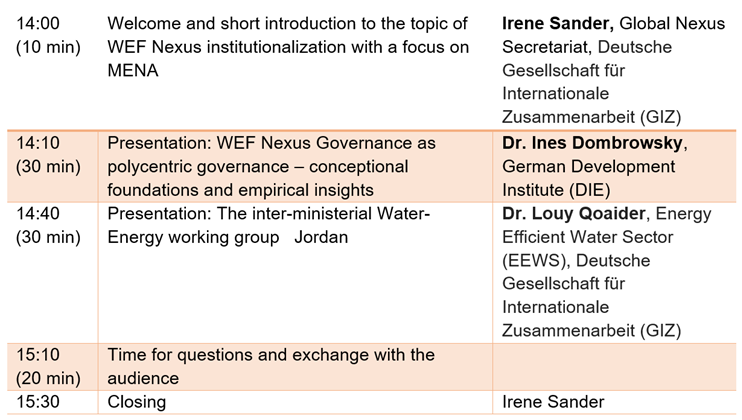Webinar // Governing the Water-Energy-Food Nexus: A policy-science dialogue
This webinar - hosted by the Nexus Regional Dialogues Programme - aims to address how cross-sectoral coordination and decision making can be successfully integrated in governance structures. It is part of the webinar series “Solutions Using Water-Energy-Food Nexus Approaches” organized by the Food and Agriculture Organisation of the United Nations (FAO).

23rd June 2022 | 14.00-15.30 CET
(With simultaneous translation into French)
How can cross-sectoral coordination and decision making be successfully integrated in governance structures?
We want to answer this question by bringing together both science and practice to reveal existing barriers, challenges and opportunities with a focus on the MENA region. We anticipate a lively discussion with the audience following to the two key presentations.
Background
We are living in a dynamic and ever-changing world. In light of global challenges and recent developments, regions and nations are struggling in managing natural resources in an efficient and just way. The complex effects of climate change in combination with global geopolitics and an increasing demand of resources are putting at risk water-, energy- and food security in the short- and long-term.
The close interdependencies between water, energy, food and the environment – along with other sectors – are calling for an integrated and holistic management of these resources. In short: breaking down established silo-structures and building up a net of integrated coordination and collaboration across sectors and levels. The Water-Energy-Food Nexus promotes tools and methods for governments and institutions to follow this road!
Being one of the most energy intensive, water and food deficient regions in the world, MENA can greatly benefit from a more coherent and integrated resource management. However, fragmented institutional settings and policies persist.
Within this webinar, we welcome Dr. Ines Dombrowsky from the German Development Institute (DIE) who will give an introduction on the governance dimension of the WEF Nexus to better understand coordination, power relations and complex systems. She will also present typical challenges focusing on the specific case of Azraq, Jordan.
The research perspective will be complimented by input from Dr. Louy Qoaider from the Deutsche Gesellschaft für Internationale Zusammenarbeit (GIZ), with practical insights to the work of an inter-ministerial working group on the interface of Water and Energy in Jordan.
The event is held within the FAO webinar series “Solutions Using Water-Energy-Food Nexus Approaches” and is being hosted by the Nexus Regional Dialogues Programme.
About the speakers
Dr. Louy Qoaider
Dr. Qoaider has over 20 years of experience as consultant and technical advisor of solar power projects in the MENA region and Germany. He has joined the German International Cooperation (GIZ) in 2018 as Team Leader of “Renewable Energy in Water Sectors”. He has a mechanical engineering background with a specialization in renewable energy engineering and management he has a PhD in Engineering/energy from the University of Rostock in Germany.
Dr. Ines Dombrowsky
Dr. Dombrowsky is head of the Research Programme ‘Environmental Governance and Transformation to Sustainability’ at the German Development Institute / Deutsches Institut für Entwicklungspolitik (DIE).
A particular thematic focus of her research lies on water and the water-energy-food-climate nexus. She has published widely on water governance issues from transboundary to local scales. She holds a PhD in Economics and an MSc in Environmental Engineering.
Agenda of the day

Registration
Registration link: Webinar-Registrierung - Zoom
(With simultaneous translation into French)
Relevant literature and documents
- Research Article // Analysing the Water-Energy-Food Nexus From a Polycentric Governance Perspective: Conceptual and Methodological Framework (By Srinivasa Reddy Srigiri and Ines Dombrowsky)
